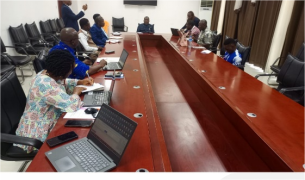The Liberian government, spearheaded by the Ministry of Labour, has implemented a significant increase in work permit fees for foreign workers, a move lauded by Finance and Development Planning Minister Augustine Ngafuan. The fee for an ordinary Liberian work permit has tripled, rising from US$1,000 to US$3,000. This decision, announced by Labour Minister Cllr. Cooper W. Kruah, Sr., is part of a broader strategy to prioritize Liberian employment within the country’s industrial sector. The government aims to discourage the influx of migrant workers and foster opportunities for local citizens, aligning with the administration’s overarching development agenda.
Minister Ngafuan’s endorsement of the fee hike underscores the government’s commitment to maximizing domestic resource mobilization. He emphasized that the increase is a direct result of deliberate government policy, specifically designed to incentivize companies operating in Liberia to prioritize the hiring and training of Liberians. This strategic approach seeks to bolster local employment while simultaneously increasing government revenue. Ngafuan clarified that the additional US$2,000 generated by the increased fee is distinct from existing revenue-sharing agreements with contracting entities and should be retained entirely by the Liberian government. This distinction, he argued, is crucial for upholding fiscal prudence and ensuring that these resources directly benefit the Liberian people.
The increased work permit fee is viewed as a mechanism to encourage a shift in employment practices within Liberia. By significantly raising the cost of hiring foreign workers, the government aims to make it more financially attractive for companies to invest in the local workforce. This strategy aligns with the government’s broader development goals of reducing unemployment and building a skilled domestic labor pool. The initiative also addresses concerns about the displacement of Liberian workers by foreign nationals, particularly in key industries. The government believes this move will contribute to a more robust and sustainable Liberian economy.
Labour Minister Kruah has affirmed that the Ministry of Labour is fully committed to integrating this new policy within the ongoing Labour Transformation Program. This program aims to create a more favorable environment for Liberian workers and promote job creation in line with the government’s overall development agenda, known as the AAID Agenda. The increased work permit fee is thus not an isolated measure, but rather a component of a comprehensive strategy to empower Liberian workers and strengthen the nation’s economy. This integrated approach seeks to address both the immediate need for greater employment opportunities and the long-term goal of sustainable economic growth.
The significance of this policy shift extends beyond immediate revenue generation. It represents a broader commitment to prioritizing local talent and building a more self-reliant workforce. By making it economically more viable for companies to hire Liberians, the government hopes to stimulate investment in training and development programs, ultimately creating a more skilled and competitive labor market. This approach is expected to have a positive ripple effect on the Liberian economy, increasing local incomes and fostering greater economic stability. Ultimately, the government envisions a workforce equipped to meet the demands of a growing economy, contributing to long-term prosperity.
In conclusion, the increase in work permit fees for foreign workers is a multi-pronged strategy aimed at strengthening the Liberian economy. It serves as a revenue-generating mechanism while simultaneously encouraging companies to invest in the local workforce. This policy, championed by both the Ministry of Finance and Development Planning and the Ministry of Labour, is integral to the government’s comprehensive development agenda. By prioritizing Liberian employment and fostering skills development, the government is laying the groundwork for long-term economic growth and prosperity, ensuring that the benefits of economic development are shared by all Liberians. This policy shift reflects a strong commitment to building a more self-reliant and resilient national economy.


